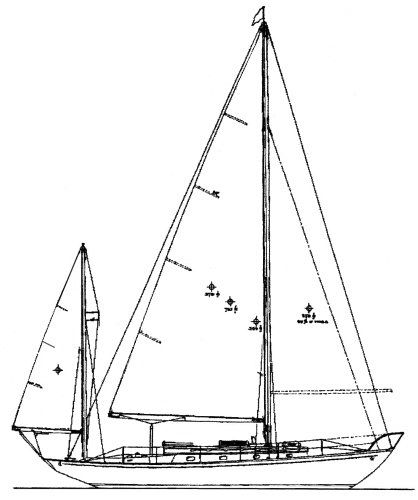The Concordia 41 is a distinguished wooden yawl, celebrated as a slightly longer iteration of the iconic Concordia 40/Concordia Yawl. Designed by the legendary C. Raymond Hunt and built by the esteemed German shipyard Abeking & Rasmussen, this model encapsulates the essence of classic offshore cruising combined with a surprising turn of speed. With its elegant lines and robust construction, the Concordia 41 has earned a reputation as a highly regarded cruiser-racer within the sailing community, admired by potential buyers, current owners, and enthusiasts alike.
Concordia 41 Information, Review, Specs

- Make
- Concordia
- Model
- 41
- Number Built
- 26
- Production Year(s)
- 1957 - 1966
History and Design
The narrative of the Concordia 41 unfolds from 1957 to 1966, a period during which Abeking & Rasmussen meticulously crafted 26 examples of this graceful yacht. The initial design for the broader Concordia Yawl class emerged in 1938 from the collaboration of naval architect C. Raymond Hunt and input from Llewellyn and Waldo Howland, quickly achieving iconic status. Hunt, a self-taught designer with an intuitive grasp of yacht design principles, firmly established his career with the Concordia Yawls, designing the Concordia 41 in 1953 to further enhance his design legacy.
Abeking & Rasmussen, established in 1907 by Georg Abeking and Henry Rasmussen, built their reputation on unparalleled quality and craftsmanship, particularly in wooden yacht construction. During the era of the Concordia 41's production, A&R was renowned for its commitment to creating "floating masterpieces" that upheld the highest standards of "Made in Germany" quality. They built a remarkable 99 out of 103 Concordia Yawls produced, solidifying their role in the legacy of these celebrated sailing yachts. While primarily built as yawls, the Concordia 41 was also available as a sloop, and some versions featured a taller rig, showcasing minor variations within the production run.
Sailing Performance and Handling
The Concordia 41's design metrics offer insights into its sailing characteristics. With a displacement of 21,450 lbs and a waterline length of 29.5 feet, its Displacement to Length ratio (D/L) is approximately 373. This high figure indicates a heavy displacement vessel, characteristic of traditional, sea-kindly cruisers built for comfort and stability in a seaway rather than outright speed in light winds. The reported sail area of 695 square feet, combined with this displacement, results in a Sail Area to Displacement ratio (SA/D) of approximately 14.47. This suggests that while capable, the Concordia 41 is not primarily a light-air performer and would likely appreciate more wind to get moving efficiently.
The ballast-to-displacement ratio stands at approximately 0.38. While just shy of the 0.40 mark often associated with exceptional stiffness, this ratio still indicates a well-ballasted boat with good stability, capable of standing up to a reasonable amount of wind and providing a comfortable motion offshore. Owners frequently praise the Concordia Yawls for their exceptional seakeeping abilities, confirming their robust construction and balanced handling in various conditions. They are generally considered comfortable, sea-kindly, and fast in all conditions, offering amazing versatility for sailors.
Accommodations and Layout
While detailed interior specifications vary between individual boats, the Concordia 41 generally offers a classic and functional layout typical of its era. Interior descriptions often highlight the use of traditional materials, such as pine bulkheads and other fine carpentry, creating a warm and inviting atmosphere. The typical arrangement would include a V-berth forward, a head compartment, a main salon with settees that can serve as berths, and a galley area. Some models might feature quarter berths aft. Owners have described interiors with traditional elements like Chelsea clocks and barometers. The general finish quality reflects Abeking & Rasmussen's commitment to craftsmanship, though some vessels may require restoration of interior elements over time.
Owner's Perspectives
Owners of Concordia 41s consistently express a deep appreciation for these vessels, often citing their timeless beauty and exceptional build quality. Many consider owning a Concordia yawl a unique opportunity to possess something truly beautiful. The boats are well-loved, with many having been professionally maintained by their owners over decades.
However, due to their wooden construction and age, some common issues are noted. Concordia yawls can suffer from chronic structural problems, particularly with their wooden keels, which were originally designed using old-growth timber. Owners often address these concerns during extensive restorations, such as replacing keel bolts or reinforcing the keel structure. Another recurring maintenance item can be the re-bedding of original deck fittings to prevent leaks. Despite these potential restoration challenges, the enduring appeal, robust performance, and classic aesthetics ensure the Concordia 41 remains a highly cherished and sought-after sailboat.
Measurements
Construction & Hull
- Construction Material
- Wood
- Hull Type
- Monohull Sailboat
- Keel Type
- Long
- Rudder
- 1x —
- Ballast
- 8250 lbs (Iron)
- Displacement
- 21450 lbs
- Water Capacity
- -
- Fuel Capacity
- -
Engine
- Engine Make
- —
- Engine Model
- —
- Engine Type
- —
- Engine HP
- —
- Engine Count
- 1
- Drive Type
- —
- Fuel Type
- —
Rig & Sails
- Rig Type
- Yawl
- P (Main Luff)
- 39 ft
- E (Main Foot)
- 17 ft
- I (Foretriangle Height)
- 43.5 ft
- J (Foretriangle Base)
- 13.75 ft
- Forestay Length (est)
- 45.62 ft
- Main Sail Area
- 331.5 sqft
- Foretriangle Sail Area
- 299.06 sqft
- Total Sail Area (Reported)
- 695 sqft
- Total Sail Area (Calc)
- 630.56 sqft
Dimensions
- LOA
- 41 ft
- LWL
- 29.5 ft
- Beam
- 10.25 ft
- Draft
- 5.83 ft
- Max Headroom
- -
- Air Draft
- -
Calculations
- Hull Speed
- 7.28 kn
- Pounds per Inch Immersion
- 1